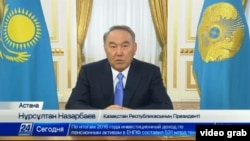Kazakh lawmakers give final approval to constitutional amendments
| Publisher | Radio Free Europe/Radio Liberty |
| Publication Date | 6 March 2017 |
| Cite as | Radio Free Europe/Radio Liberty, Kazakh lawmakers give final approval to constitutional amendments, 6 March 2017, available at: https://www.refworld.org/docid/5975a5e713.html [accessed 15 October 2022] |
| Disclaimer | This is not a UNHCR publication. UNHCR is not responsible for, nor does it necessarily endorse, its content. Any views expressed are solely those of the author or publisher and do not necessarily reflect those of UNHCR, the United Nations or its Member States. |
March 06, 2017
 Kazakh President Nursultan Nazarbaev
Kazakh President Nursultan Nazarbaev
Kazakhstan's parliament has given its final approval to legislation that would amend the country's constitution, curtailing some presidential powers and redistributing them to government ministers and lawmakers.
The legislation, approved by lawmakers on March 6, will become law once it is signed by President Nursultan Nazarbaev, who originally proposed the constitutional amendments.
The 76-year-old Nazarbaev is the last communist-era leader who still holds power in a former Soviet republic.
Nazarbaev proposed amending the constitution to give government ministers more power and responsibilities over the management of social and economic development in oil-rich Kazakhstan.
He has said parliament's control over the government would be increased through the amendments by giving lawmakers the authority to hold a "vote of no confidence" on a sitting cabinet.
The moves have spurred speculation that they may be aimed at facilitating an eventual political transition.
Devolving some presidential powers would make it easier for Kazakhstan's political elite to manage a succession by splitting key roles between different figures rather than allowing one successor to concentrate power in his or her hands.
When he announced plans for the amendments on January 26, Nazarbaev said the president's role would become that of a "supreme arbiter."
'Democratic Principles And Actual Realities'
Serikbolsyn Abdildin, the former leader of Kazakhstan's now defunct Communist Party, called the amendments "cosmetic."
He said a "parliament that is controlled by one person will never change."
Well-known political analyst and journalist Sergei Duvanov also expressed doubts about the practical ramifications of the amendments.
Duvanov told RFE/RL that there "cannot be any essential changes in the parliament's work as the lawmakers are members of the tightly controlled presidential Nur-Otan party and two other pro-presidential parties."
Almaty-based political analyst Rasul Zhumaly told RFE/RL that the constitutional amendments make "democratic sense."
"The changes proposed by the president are in fact very close to democratic principles," Zhumaly said. But we know that in our country there is a big difference between what was said and adopted as a law and what the actual realities are."
Kazakhstan's presidential press service said on March 6 that Nazarbaev had sent the bill to the Constitutional Council for review before he signs it into the law.
With reporting by Reuters
Link to original story on RFE/RL website
